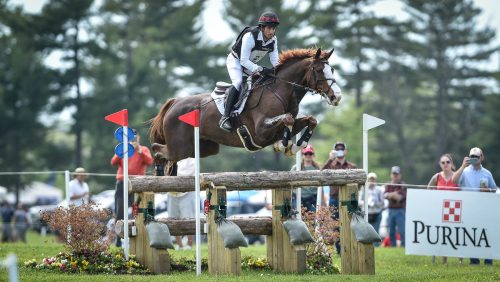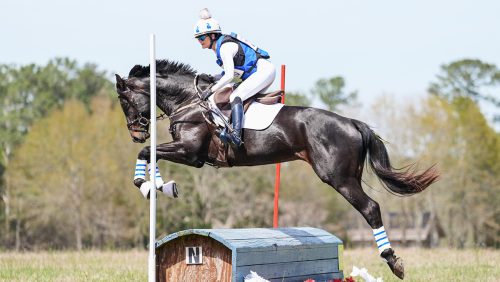Rolex is here!
We’re underway with the five-day, yearly U.S. eventing “Olympics,” which gives everybody a chance to put away work for a little while and pack four seasons worth of clothing in far too many bags and head toward the center of the country—Do I bring a light jacket? Rain Coat? Snow Pants? Bathing suit? Fleece long underwear? Yes to all of it. All appropriate for Rolex.
We might be pulling our savings out of Digit to finally get that pair of fancy boots where they might even give you champagne and a nice place to sit, or maybe you’ll be sitting in saddles to find that perfect flap for your too-long femur. Me? I need exactly nothing. Except maybe a bit that I don’t already own, don’t need and will never use….amirite ladies and sporadic gents?
As predictable as the unpredictable Kentucky weather and James Alliston’s Parker taking out the jog-lane geraniums and the ground jury in one fell swoop, we have ex-racehorses and full Thoroughbreds entered at Kentucky.
I started researching these entries more than 10 years ago and in that time it’s been made clear that I don’t really have to do the exhaustive research any longer because lots of other people do it now…Weeeee!
So I thought I’d ramble on some other stuff.
It’s pretty regular that I see social media posts asking about particular bloodlines and how they might work out for eventing. Over the years I’ve found some that I think “Oh yes! I want that in my barn” but the reality is that when it comes down to it, bloodlines are just a piece of paper. Sure, some horses tend to throw a certain type, some have better bone, some have conformation ideal for eventing—but it all comes down to the individual and its circumstances rather than who its parents are.

Blackfoot Mystery, a Thoroughbred with talent who landed in all the right places. Photo by Allie Conred
We tend to analyze horses who reach the four-star echelon and immediately scramble for those bloodlines, or we take a view from the top and look at the fact that Seattle Slew doesn’t usually appear in too many four-star horses. After many years tumbling this around in my brain I’ve decided it’s kind of horse-puckey.
Let’s take a look at just how many successful four-star full Thoroughbreds there are in any given year. Averaging the number of full Thoroughbred entered in four-stars over the last 10 years would take more time than I’m willing to give it at this time, but for grins lets say there are 60 Thoroughbreds completing four-stars per year. This is just taking into account those who make it and complete a four-star.
ADVERTISEMENT
This doesn’t take into account those who did all the things that horses can do in their ultimate mission to commit suicide in the most inconvenient and expensive way possible. To take that group of elite horses and extrapolate conclusive data from it is fallible. To look at this elite group and figure out what stallions don’t appear is just as caustic as guiding all of your decisions on those who do. Haven’t seen Seattle Slew appear in a while? It really does not mean that the Seattle Slew line horses don’t have the goods to compete on the world stage, it just means that there doesn’t happen to be a plethora that landed in the right place with stars aligned to get there.
Take two horses—one has the classic stamp of an eventer and all the “right” bloodlines. Just the right size, uphill build with a long neck, big wither, slightly long back, big shoulder with an open layback. The other is smaller with nothing super special about them on first glance.

Laine Ashker and Anthony Patch, an off-the-track Thoroughbred who might not have been the perfect specimen, but turned out to be the perfect horse. Photo by Allie Conrad
Which one do you purchase for upper level eventing provided both vetted cleanly?
The problems we run into often can’t be caught in a pre-purchase. Horse 1 may have had a starting gate accident, or may have collided with another horse on the gallop. Consequently he’s winning the lengthening at home, but you can’t get him to the event and even after a year of trying to make him comfortable with the trailer you have to deal with the chaos of warm-up. Properly managed and retrained this perfect specimen MIGHT make it to the upper levels, but chances are he will not.
Simple Horse 2 just keeps plugging along, scoring 7s all day long but running, jumping, jogging sound and hopping on the trailer to get home.
Which horse do you buy after you have these facts? This is the risk of buying a green horse.
We also have to take into consideration that these lovely and capable horses are being purchased many times by amateurs who really love their horses and want to stay at the lower levels despite their horses having the talent for the elite levels of the sport. Part of me always thinks “they should get the horses to the good riders!” But then I remember that I have a freak of nature and two phenomenal specimens sitting in my barn going for bareback halter rides in local ponds and doing champion trot races with the neighbors with the grand prize being a six-pack of beer.

No, don’t get the horse you love to the good riders if you don’t wanna—ride your good horse and smile the entire time if you want.
ADVERTISEMENT
It’s all a crapshoot. Each time I think I’ve learned something a simple little horse will come along, trot down and make me say, “Wow. TOTALLY underestimated you”.
And so Thoroughbred nerds I give you some advice:
Poke through these bloodlines with an open mind and look into ways of increasing your horsemanship so that if you DO get that special one, you know how to bring it along to give it the best chance for success. Slow down. Race track to novice is not a competition and you’ll ruin far too many horses by attempting to play that game.
Know your bloodlines, but don’t allow them to completely guide your decisions
If you run into trouble with your Thoroughbred, slow down and ask for help from qualified, experienced people.
Don’t push a horse to do something he’s not comfortable with and responsibly re-home a horse instead of stuffing a square peg into an eventing-shaped hole.
Celebrate these elite Thoroughbreds who made it to Rolex and cheer loudly for every horse who ended up in the right hands at the right time and know that there are dozens entering the starting gate this week who might be trotting down centerline here in five years.
Allie Conrad founded CANTER Mid Atlantic in 1999 at Charles Town Racetrack (W.V.) after purchasing her beloved Thoroughbred Phinny, who had more than 60 starts at Charles Town, at the infamous New Holland Auction in Pennsylvania. You can read all her blogs for COTH here.














